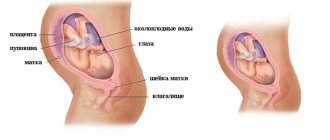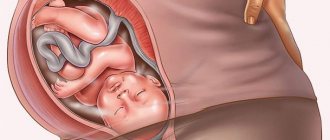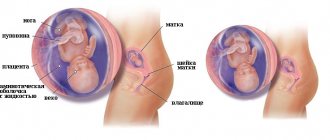Fetal development at 28 weeks of gestation
At this time, not a single day goes by in the fetus without some kind of “improvement”. The baby continues to actively prepare for the upcoming birth. At this time, his body weight is about 1.5 kg or more. Moreover, weight is gained due to the formation of subcutaneous fat tissue. Height reaches 38.5 cm.
- The fetal skeletal system becomes stronger.
- Alveoli form in the lungs, which will allow the child to breathe independently.
- The baby’s brain is developing intensively, new grooves and convolutions are formed in it.
- The baby's skin begins to gradually smooth out.
- At this time, the child opens his eyes for the first time. They will be blue, but over time the shade may change. The baby's eyes are already fringed with eyelashes, which, like the hair on the head, continue to grow rapidly.
- The child already hears very well. He can distinguish familiar voices and sounds and give a reaction to them. For example, when the music is loud, the baby begins to move more actively, and when he hears the mother’s calm voice, he calms down.
Although the baby feels a little cramped in the uterus at this time, his activity does not decrease. It makes itself felt not only during the day, but also at night.
Fetus at 28 weeks
The 3rd trimester of pregnancy has arrived. It's time to visit the antenatal clinic more often. The baby takes up almost all the space in the mother's belly. It becomes increasingly difficult for a woman to endure pregnancy. 28 weeks – the baby’s weight is already about 1 kg; his height is approximately 35 cm. These are average figures. Individual characteristics of fetal development may vary. Both weight and height may be slightly more or less.
If you are 28 weeks pregnant, what happens to the baby? The brain begins to actively develop. Up to this point it was smooth. After 28 weeks, convolutions begin to form in it. The heart beats at a frequency of 150 beats per minute.
The baby's lungs are still weak and underdeveloped. However, at this stage the child is quite capable of surviving with medical help. Of course, babies are cared for at an earlier stage. But it is from the 3rd trimester that the child is legally considered a newborn.
Pregnancy 28 weeks - how many months? Considering that the obstetric month is 28 days, the 7th month begins at this time. The child's facial features become clearer and his cheeks are rounded. He begins to yawn much more often. Hair accumulates pigment and begins to darken.
How does a woman feel at 28 weeks?
During this period, the woman must feel the baby’s movements. They are quite active and regular. It is important not only to enjoy every movement of the baby, but also to track them. This is especially true for morning and evening time.
Most often, the most active fetal movement is observed in the evening. During the day, the baby is usually rocked to sleep by the measured movements of the mother. However, as soon as she lies down, the baby begins to take active action.
It is possible that the child's activity may increase after the woman has eaten. This is a natural reaction of the fetus to an increase in glucose levels in the mother's blood. In a similar way, the baby reacts to a surge of adrenaline, which always occurs against the background of emotional overexcitation or stress.
If we take average statistics, then a fetus at 28 weeks of pregnancy makes about 10 movements in 10 minutes. However, some children are more active and some are less active. Therefore, the norm is considered to be 10 or more movements per hour. If there are fewer of them, then you should consult a doctor about this. When there is no movement at all for 24 hours, you should immediately consult a doctor.
It makes sense to take classes on birth and child care
Taking a childbirth class can help ease your labor worries. Your partner can also receive a certificate to be with you and hold your hand throughout your baby's birthday. Newborn classes, on the other hand, can also boost your confidence in caring for your baby. He can also help you and your partner discuss circumcision, breastfeeding, vaccinations and more. Many expectant mothers use the forum at 28 weeks of pregnancy to exchange useful tips with other pregnant women.
What's happening to the stomach?
The woman continues to “round up”; her belly already looks quite large. At this time, the skin on it becomes very tense, which can provoke a feeling of itching. If the abdomen quickly increases in size, then purple stripes may appear on it - these are stretch marks (stretch marks). Getting rid of them in the future will be very problematic, so it’s easier to prevent their occurrence. For this purpose, you can use special creams, lotions and gels. Oils and their mixtures also work well against stretch marks. You can use coconut, olive, almond oil in various combinations.
Uterus
The uterus continues to grow and may begin to contract slightly. This is expressed in the appearance of a feeling of slight tension in the lower abdomen, which is sometimes accompanied by mild pain. There is no need to worry too much about this; in this way the body trains and prepares for the upcoming birth. However, if the pain becomes more intense, bleeding appears, and the duration of contractions increases, then it is necessary to call an ambulance.
Now, normally, the uterus is 8 cm above the navel and 28 cm above the symphysis pubis. This is not the limit; as the child grows, it will rise even higher.
Pain
A woman at 28 weeks of pregnancy may experience various pains. First of all, discomfort occurs in the lumbar region and back. Such pain is caused by increased stress on the spinal column, as well as softening of joints and ligaments before the upcoming birth.
Sometimes the pain starts in the back, extends to the thigh and reaches the knee. This is due to the fact that the enlarged uterus compresses the sciatic nerve. In this case, the pain occurs periodically and is not too intense.
An immediate call to the ambulance requires the appearance of sharp and intense pain in the lumbar region, which occurs like contractions. Such sensations may indicate premature onset of labor.
From time to time, a woman may experience pain in the abdominal area. They need to be treated carefully.
Depending on the nature and location of the pain, it may be due to the following reasons:
- Sharp, but instantly passing pain in the area of the right hypochondrium is caused by the child’s active movements.
- A dull pain in the right side that appears a few hours after eating may indicate cholelithiasis or cholecystitis. Especially when symptoms such as belching, nausea, and a tugging feeling in the lower abdomen occur in parallel.
- Leg pain caused by muscle spasms may indicate a lack of calcium in the body. In this case, you need to consult a doctor who can prescribe special medications. Massage of the legs and calf muscles can help alleviate the condition.
Special attention should be paid to swelling. Mild swelling can worry almost every pregnant woman. Concern should be shown when swelling becomes severe. This may be the first sign of dropsy of pregnancy, which can later develop into gestosis. Therefore, you need to carefully monitor your diet and regularly monitor your weight gain. You may need to reduce your fluid intake.
If you are prone to swelling, you need to drink about 1.5 liters of water per day. To avoid feeling thirsty, you should avoid foods that can provoke it. This applies to all salty, spicy and fried foods. Salt consumption should also be limited. It is equally important to monitor the volume of urine excreted. Normally, more liquid should be released per day than the volume of liquid that came from outside.
Pregnancy symptoms 28 weeks
If you notice new symptoms, tell your doctor so they can rule out possible complications.
As you produce and circulate more blood to meet your growing baby's needs, your body also produces increased body fluids that can accumulate in your tissues. You may be dealing with increased vaginal discharge, vision problems, varicose veins, hemorrhoids, swollen ankles, feet and hands, and sore, bleeding gums.
Sciatica
As your baby moves to place his head first in your birth canal, his weight and enlarged uterus can put pressure on the sciatic nerve at the bottom of your spine. As a result, you may experience sciatica, a sharp, shooting pain, tingling or numbness that starts in the buttocks and radiates down the back of your legs.
Encouraging your child to shift positions can help relieve pressure on the sciatic nerve. You can try talking to him or gently poking or rocking the baby. The pressure may persist until you give birth. A warm compress, stretching, and good sleep can also help relieve discomfort. Seek medical advice if the pain becomes too severe. Do not take any medications without consulting a doctor.
Pain in joints and ligaments
You may experience pain in your back, hips, lower abdomen, arms or wrists (or carpal tunnel syndrome), and pelvic area (called symphysis pubis dysfunction, or SPD). This is due to the pregnancy hormone relaxin, which loosens your joints and ligaments in preparation for childbirth.
You may also experience painful leg cramps (often in the middle of the night, no less!) and restless leg syndrome (RLS).
Exercise, stretching and good posture can help relieve these pains. Tell your doctor right away if any pain becomes more intense.
Sleep problems
You probably aren't getting as much sleep as you'd like. Your body is still going through a lot of changes during pregnancy—your belly gets even bigger and heavier.
Pillows are very helpful for back pain. Meditation and drinking warm milk before bed can also help. If you're still awake, try to be productive. Just stay away from negative thoughts!
Braxton Hicks cuts
28 weeks is how many months of pregnancy? - This is the beginning of the 7th month. Do you feel your stomach getting tense? It's probably Braxton Hicks or fake contractions. These are mild, irregular contractions that help prepare the uterus for labor. Braxton Hicks contractions, however, do not increase in intensity or frequency, unlike real contractions. They should not be too painful and ideally go away when you change position.
If you feel the contractions getting stronger and you feel short of breath after each one, consult your doctor immediately.
Breast milk leaks
Your breasts are preparing to produce milk from the very beginning of your pregnancy. Depending on your hormone levels, you may notice thin, milky fluid leaking from your breasts. There is no need to worry and take precautions such as using pads to prevent breast milk from leaking and making sure your breasts are supported by a good maternity or nursing bra.
Dizziness and shortness of breath
28 weeks pregnant: Your growing uterus also puts pressure on your veins, which limits oxygen distribution, especially to your brain. This also prevents you from taking a full breath. Take your time moving from lying to sitting to standing. If you often feel dizzy or experience headaches, ask your doctor to help treat our anemia or preeclampsia.
Digestive and nutrition problems
Your baby's growth means more pressure on the entire digestive tract, where muscles are more relaxed and may not function as well as they should. Drink plenty of water and eat foods rich in fiber. Stay away from foods that produce gas, such as fried foods, broccoli, root vegetables and beans.
A weakened muscle valve between the stomach and esophagus and a growing uterus pressing on your stomach are to blame for your heartburn. Eat slowly and drink plenty of fluids after you eat. Avoid eating spicy and fatty foods.
Can labor begin at 28 weeks of pregnancy?
Sometimes it happens that at 28 weeks the baby decides to leave the mother's womb. In this case, the birth is considered premature, although the fetus is already viable. Moreover, the probability of the child’s survival is very high, but the mother and the baby will need qualified medical care and connection to special equipment.
Often, childbirth at this stage is rapid, which is not very good for the woman herself. Possible complications include: weak labor, early discharge of amniotic fluid, bleeding during and after childbirth, injury to the birth canal and cervix.
If a woman’s contractions suddenly begin to intensify, she should not hesitate to contact a doctor. The fact is that at the initial stages they can be stopped, which will allow the pregnancy to be carried to its due date.
Your to-do list at 28 weeks pregnant
28 weeks of pregnancy is how many months? - this is 7 months - you are officially in the third trimester. Now it is more important for you to take care of yourself. Listen to your body and avoid exhaustion, so take a break if you have to and start delegating. Avoid panic.
Make sure you stick to your prenatal checkup schedules
Starting in the seventh month of pregnancy, you will need to see your doctor twice a month. Later in your third trimester, as your due date approaches, starting at 36 weeks, you will have weekly checkups so your doctor can closely monitor your baby's health.
Prepare all necessary documents and bags
It's time to quickly check the necessary documents required for maternity leave. Take the time to prepare your budget for the costs of childbirth, make sure how much it costs. You should also start preparing the documents that your partner needs to bring to the hospital when the due date arrives. You should also start packing your hospital bags!
Be prepared for the unexpected
28 weeks pregnant what month? - This is the 7th month of pregnancy, the time when by now you should have your final birth plan. Unfortunately, it is impossible to accurately determine whether there is a risk of premature birth, however, you need to be prepared for anything.
Premature labor can happen at almost any time—and quickly. The moment you feel like you're going into labor—regular, increasing contractions, bleeding—go to the hospital emergency room as soon as possible. You should also tell your doctor if you have severe headaches and blurred vision, which may be signs of preeclampsia, and if you notice decreased fetal movements.
What tests should be taken at 28 weeks?
At this time, the woman should visit the gynecologist’s office, who will refer her for the following tests:
- General urine analysis;
- Clinical blood test;
- Blood sugar test;
- Blood test for antibodies (provided the woman has a negative Rh factor).
The last analysis is necessary to identify Rh conflict, if any. Its timely diagnosis will allow you to avoid many complications of pregnancy. According to indications, a woman can be given the drug. Its action will be aimed at suppressing the production of specific antibodies that the mother’s body can produce against the fetus.
The beginning of the third trimester should definitely start with a visit to the gynecologist. Now visits to the doctor are becoming more frequent up to 2 times every 30 days. During each appointment, the woman receives a referral for urine tests (blood is collected for testing as needed). The doctor will also measure your blood sugar levels and monitor your blood pressure levels. In this way, it will be possible to prevent the development of diabetes in the early stages.
Signs of pregnancy 28 week
During the 28th (twenty-eighth) week of pregnancy, your belly becomes crowded as your organs move to make room for your baby. You'll appreciate the pregnancy glow, shiny locks, and maybe your nails growing faster than usual. But changes in skin color, itching and stretch marks (if any) are unlikely to make you happy. They should disappear soon after delivery.
Depending on the results of your blood sugar test and your weight gain, your doctor may prescribe you a strict diet or see a dietitian to monitor your weight gain. Follow their advice because it will help you avoid or manage pregnancy complications such as gestational diabetes or preeclampsia. The fewer difficulties at this stage, the higher the chances of a safe birth.
Try to move despite your growing belly. Pregnancy exercise for 20 to 30 minutes three times a week is still ideal unless your doctor tells you not to. Not only will these workouts help you control your weight and ease some of your pregnancy symptoms, but they will also help you prepare for childbirth.
Below is the 28th week of pregnancy, what happens to the baby and mother photo:
Diet
The way a woman eats and what is included in her menu affects the health of the child as a whole. Therefore, it is very important that nutrients are supplied to the baby in the proper amount. A properly structured diet will not only allow you to better tolerate pregnancy, but will also make it possible to facilitate the process of childbirth.
You need to eat food in small portions, but often (up to 6 times a day). A woman should receive about 3000 kcal per day, eating the most high-calorie foods in the first half of the day. The last meal should take place 2-3 hours before going to bed. Of course, if you are haunted by a feeling of hunger, you can muffle it with an apple, kefir, cottage cheese, milk, vegetable salad or other light foods.
It is also worth paying attention to the amount of salt consumed. It must be limited to prevent the appearance of edema.
Avoiding gaining extra pounds will help you avoid eating sweets (chocolate, candies) and baked goods based on white refined flour.
The more easily digestible carbohydrates a woman enters her body, the higher her risk of developing gestational diabetes. Therefore, you should try to include in your menu foods that contain complex carbohydrates. They help prevent a sharp jump in blood sugar and do not put stress on the pancreas. Among such products are almost all cereals, whole grains, and bread based on wholemeal flour. It is imperative that the body receives a sufficient amount of fiber, which is found in abundance in vegetables and fruits. Thanks to this, you can regulate the functioning of the gastrointestinal tract and normalize digestion processes.
What kind of discharge can there be?
A woman has very few options as to what kind of discharge at 28 weeks of pregnancy can be considered normal. They should be light or milky in color, without foreign impurities, with a slight sour odor.
You should definitely consult a doctor if the discharge becomes cheesy, turns green, yellow or brown, or contains blood or mucus. An infection may additionally be indicated by a sensation of itching and burning in the intimate area.
Discharge with blood cannot be delayed; an ambulance must be called immediately. It does not matter whether the woman’s bleeding is heavy or light. Bloody discharge may indicate placental abruption or the onset of premature labor. All these conditions pose a threat to the health of the child and mother. You need to contact the emergency dispatch service even if the woman does not experience pain due to bleeding.
Watery discharge is also not normal and often indicates leakage of amniotic fluid. They can be released in small portions or poured out en masse. This happens due to a violation of the integrity of the amniotic sac, which requires medical attention.
Twenty-eighth week of pregnancy
28 weeks is how many months?
The obstetric period is slightly different from the actual one. 28 weeks of pregnancy is the end of the 7th month. It marks the beginning of the last trimester of pregnancy.
The 28th week of pregnancy can in many ways be a turning point for the expectant mother and her baby. This can be explained by the fact that a woman can begin to prepare documents for maternity leave (and in the case of multiple pregnancies, it is from this period that maternity leave paid by social security authorities begins). After the 28th week of pregnancy, the baby’s body begins to produce a special substance in the lungs - surfactant, which prevents the baby’s lungs from collapsing when breathing out atmospheric air. Therefore, a child in the event of premature birth at this stage of pregnancy has a fairly good chance of survival, but subject to the mandatory use of special breathing equipment.
Twenty-eighth week of pregnancy
At the 28th week of pregnancy, the baby’s body already reaches a body weight of more than 1 kilogram, and the body length already exceeds 37 cm. The baby gradually accumulates subcutaneous fat, and the surface of the body is covered with a special lubricant, which facilitates the baby’s movements in the uterine cavity. The eyelashes surrounding the baby's eyes lengthen, the hair on the head and body becomes longer, but is located over the entire surface. The skin remains red and wrinkled, but the number of folds gradually begins to decrease.
The baby’s sensory organs are quite well developed, there are more taste buds on the tongue than at the time of birth, so the baby subtly reacts to changes in the composition of the amniotic fluid - the baby regularly swallows it, preparing for extrauterine life. The child gets the opportunity to hear the sounds of the surrounding world well, so for the development of the baby, you can actively use “conversations” with him and listen to classical music.
The baby's body at 28 weeks of pregnancy
Intimate life
If the pregnancy is going well, then having sex during this period is allowed. Intimate intimacy can bring joy to a woman, improve her mood, and bring pleasure. It is now impossible to harm the fetus, provided that both partners are careful. It is important to choose a position that does not put pressure on the abdomen.
In the case when a doctor says that it is best to abstain from intimate life, he has good reasons for this. It is imperative to follow the doctor's recommendations.
What dangers can occur at 28 weeks of pregnancy?
- A woman becomes clumsy not only because of her growing belly, but also because of significant weight gain. This is why it is important to exercise extreme caution to prevent injury.
- During this time, many women begin to experience symptoms of anemia, as circulating blood volumes increase significantly and hemoglobin levels decrease.
- Perhaps the woman will be concerned about increased swelling in her arms and legs.
Symptoms of pregnancy at 28 weeks
Significant changes also occur in the mother’s body by the 28th week of pregnancy. A normal increase in body weight should not exceed 9 kg, and this increase consists of the weight of the baby’s growing body and an increase in the amount of fluid in the mother’s body. From now on, a woman must visit her obstetrician at the antenatal clinic at least once every two weeks.
The baby actively pushes you from the inside, communicates with you, expresses emotions about what it eats, responds to your mood, voices and touches, or the environment. If the baby feels cramped in the position you have taken, he begins to worry and tap on the uterus. Night movements are caused by a discrepancy between the sleep and wakefulness patterns of mother and child.
A pregnant woman's breasts continue to grow in preparation for feeding. Colostrum may leak from the nipples, and sanitary pads for the bra can help. Frequent dizziness and weakness can be caused by low levels of hemoglobin, which is involved in the delivery of oxygen to the body's systems.
Unaccountable fears and anxieties can now rule you. The mood is changeable and unpredictable. No wonder: there is less and less time left before giving birth, you are afraid of how everything will go, much is not ready yet, being a good mother seems to you something unattainable and difficult, you are full of doubts and often cry. It is important now to find support from loved ones, visit a school for mothers at the maternity hospital to calm the fear of the unknown a little, and if the depressive state does not leave you, you can contact a psychologist. Very often, specialists of this profile work at antenatal clinics. There is nothing shameful in asking for help: you are faced with a qualitatively new condition and are experiencing stress. Ignored mental signals can cause postpartum depression.
Adviсe
- It is important to monitor the number of baby movements per hour. The norm is at least 10 pushes in 60 minutes.
- Signs of increasing anemia are weakness, dizziness and pale skin. If they occur, you must consult a doctor and donate blood to determine your hemoglobin level.
- It is good if it is possible to attend courses for pregnant women.
- The menu must include products such as honey, cranberries, prunes, and nuts. This will saturate your body with iron.
- All dishes included in a woman’s diet must be freshly prepared.
- According to some experts, a woman’s emotional mood directly affects digestion. The better the mood, the more active the intestinal villi work, which means the child receives more nutrients.
Answers to popular questions
- Is lower abdominal pain normal at 28 weeks of pregnancy?
Mild pain that does not cause discomfort to a woman can be considered normal. Their cause lies in the sprain of the uterine ligaments. Training contractions during this period can also be noticeable, but not painful. Therefore, if severe pain occurs, you should immediately consult a doctor.
- What indicates water leakage at 28 weeks of pregnancy?
As a rule, it is impossible not to notice water leakage, even if it is not too intense. In any case, only a doctor can determine the exact nature of a woman’s discharge. Therefore, if you suspect a water leak, you should consult a doctor.
- I have a very small belly for 28 weeks of pregnancy, but the baby is of normal size. Is it possible?
Belly size is a purely individual indicator. In this case, the height of the uterine fundus is important - if this indicator is normal, then there is no need to worry.
- I am 28 weeks pregnant and my uterus has increased tone. This is very bad? Is it possible to have sex at the same time?
With increased uterine tone, intimate life is prohibited. Moreover, the woman may even be hospitalized. Therefore, it is important to consult a gynecologist on this topic.
- The baby is in a breech position. Can it change at 28 weeks of pregnancy?
There is still enough space in the uterus for the baby to change its body position. Sometimes doctors recommend performing special exercises that will allow the fetus to turn over.
Author of the article: Lapikova Valentina Vladimirovna | Gynecologist, reproductive specialist
Education: Diploma in Obstetrics and Gynecology received from the Russian State Medical University of the Federal Agency for Health and Social Development (2010). In 2013, she completed her postgraduate studies at NIMU named after. N.I. Pirogova.
Our authors
Childbirth at 28 weeks
This week carries the risk of early labor. Modern equipment can help doctors deliver a baby, provide support for its development outside the mother’s body, and - good news - premature babies have every chance not only to survive, but also to quickly catch up with their peers born on time in all respects.
With the body of a woman in labor, not everything is so simple. Early childbirth is a tremendous burden and stress. The birth canal is not ready for the passage of the child, there are no contractions, which means that childbirth can result in consequences such as heavy bleeding and ruptures.
Childbirth at 28 weeks










